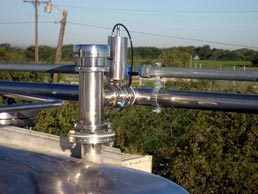A CLEAN BURNING ALTERNATIVE FUEL FROM RENEWABLE RESOURCE
A CLEAN BURNING ALTERNATIVE FUEL FROM RENEWABLE RESOURCE

Biodiesel is a renewable alternative fuel created from vegetable oils, animal fats, and greases through a chemical process. The chemical process involves reaction of natural oils with an alcohol, and then refining the mixture to create molecules which can be easily burned in a diesel engine. Biodiesel fuel can be used in any diesel engine in pure form or blended with petroleum diesel at any level. Even a blend of 20% bio- and 80% petroleum diesel will significantly reduce carcinogenic emissions and gases that may contribute to global warming. Glycerin is the byproduct of the biodiesel production process, and can be used in personal care products or a variety of chemical applications.
Per a recent market study, the production and use of biodiesel fuel promises to bring $24 billion to the U.S. economy between 2005 and 2015, assuming biodiesel growth reaches 650 million gallons of annual production per year by 2015.1 This study also projected:
Biodiesel production will create 39,102 new jobs in all sectors of the economy.
Additional tax revenues from biodiesel production will more than pay for the federal tax incentives provided to the industry, keeping $13.6 billion in the U.S. that would otherwise be spent on foreign oil.
WHAT IS BIODIESEL
- Biodiesel is a clean burning renewable fuel made using natural vegetable oils and fats.
- Biodiesel is made through a chemical process which converts oils and fats of natural origin into fatty acid methyl esters (FAME). Biodiesel IS NOT vegetable oil.
- Biodiesel is intended to be used as a replacement for petroleum diesel fuel, or can be blended with petroleum diesel fuel in any proportion.
- Biodiesel does not require modifications to a diesel engine to be used.
- Biodiesel has reduced exhaust emissions compared to petroleum diesel fuel.
- Biodiesel has lower toxicity compared to petroleum diesel fuel.
- Biodiesel is safer to handle compared to petroleum diesel fuel.
- Biodiesel quality is governed by ASTM D 6751 quality parameters.
- Biodiesel is biodegradable.

WHAT IS NOT BIODIESEL
Look Carefully! Many companies and groups improperly use the word biodiesel to describe diesel fuel replacement products they have developed. This creates significant confusion for consumers looking to purchase and use biodiesel. Some of these alternatives have not been properly tested and could lead to damage to vehicles. Below is some information to help distinguish real biodiesel from imposters.
What biodiesel IS NOT:
- Biodiesel is not vegetable oil.
- Biodiesel is not vegetable oil diluted with solvents, i.e. diesel fuel or alcohols.
- Biodiesel is not vegetable oil with “special additives” to make it run better.
- Biodiesel is not vegetable oil refined through a conventional oil refinery process.
- Biodiesel is not vegetable oil refined through thermal depolymerization (renewable diesel).
- Biodiesel is not a fuel that requires costly modifications to your diesel engine (straight vegetable oil).
- Biodiesel is not crude methyl esters which have not been refined or minimally refined.
Unlike biodiesel, none of the fluids listed above have undergone renewable fuel certification, emissions or toxicity testing, or long-term reliability testing in engines and vehicles.
How to Make Sure You are Getting Biodiesel
In order to be called biodiesel and receive certain tax credits specifically intended for biodiesel:
- Biodiesel must be produced from naturally occurring fats and oils using transesterification.
- Biodiesel must be composed of fatty acid methyl esters.
- Biodiesel must be refined to remove all trace impurities.
- Biodiesel must meet the ASTM standard D6751 “Specification for Biodiesel (B100)”.
If a fuel product does not meet these requirements it IS NOT biodiesel, and does not qualify for tax credits relating to biodiesel. The most important thing to ask your fuel provider is if the biodiesel is ASTM certified.

